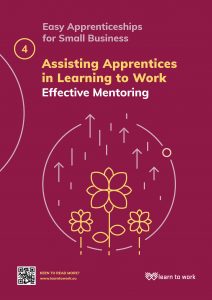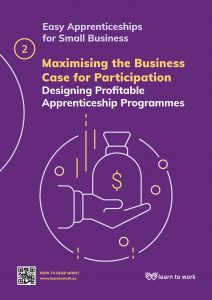Assisting Apprentices in Learning to Work
Effective Mentoring
Easy Apprenticeships for Small Business
 A successfully implemented apprenticeship is a win-win situation for both the SME and for the student.
A successfully implemented apprenticeship is a win-win situation for both the SME and for the student.
The student gains an opportunity to complement the learning done in the classroom with practical knowledge gained from the workplace, giving them a full picture of their programme of studies.
The SME acquires an opportunity to recruit a new employee and access to new knowledge, techniques and resources of educational institutions.
This booklet gives tips as to how to structure the mentoring process to encourage a long-term partnership between an SME and its apprentices, presenting a structure for internal and external development of the SME.
.
- Apprentices help in performing work. By sharing responsibility with apprentices on routine or time-consuming task, such as different types of analysis, searching through resources, finishing unfinished jobs, etc., employees can optimise their work and increase productivity
- Assisting and training apprentices gives the mentor another insight into their work. In these situations, one often sees their job from a distinct perspective, learns new things about it, and often discovers new opportunities and improvement possibilities in the job.
- Apprentices can increase collaboration at the work-place: Typically, apprentices need to learn a multitude of tasks, spread across different departments, and interact with people throughout the company. This can often help break-down silos between departments and improve collegiality.
“Mentoring requires a fully dedicated staff member”
While it is good practice to assign a mentor to each apprentice, that doesn’t mean mentor should spend all his/her time with the apprentice. According to some studies up to 30% of mentors time can be spent on giving instructions, working with the apprentice and monitoring their work. Depending on the style of mentoring and experience of mentor it can be as little as 10% which leaves enough time for mentor to work on his/her primary tasks.
Nevertheless, some of the mentor’s regular work does needs to be reallocated to other employees, to allow for proper mentoring of the apprentice. The cost of an employee’s time spent on mentorship needs to be evaluated in the business plan and offset by gains of having an additional person doing apprenticeship in the company.
“Mentors should be experienced in human resources”
In companies that have an HR department, training and apprenticeship-management often fall to the HR department. However, the job of a mentor is not to manage the skills-strategy of the company – it is their job to impart their personal skills and ways of doing things to an apprentice. Thus, with a bit of basic training in mentoring skills, anyone can be a mentor.
“Apprenticeship has no benefit for the mentor”
Good apprenticeships benefit not only the company and apprentice but also the mentor. Mentors transfer valuable skills, knowledge and insights to apprentices to help them develop in their career and personally. In return, mentorship gives mentors an opportunity to revaluate and optimise the efficacy of established procedures in the company. It also brings a fresh pair of eyes to entrenched procedures from persons with solid theoretical background. In this way apprentices can bring a valuable contribution to any SMEs team.
For implementation of an effective apprenticeship scheme SMEs should consider these steps in setting up their system for mentoring:
Designate a responsible person or persons to guide, mentor and monitor the apprentice throughout the apprenticeship. This person should not be a superior far out of reach but a person at the workbench in regular contact with the apprentice.
Organise for the prospective mentor to take training on how to be a mentor – typically your local Higher Educational Institution will offer training or guidance in this area. Otherwise, there are a wealth of materials available online.
Share the description and aim of the apprenticeship scheme and placement with your staff. Relevant staff of your company must have a clear idea of the placement and its characteristics, so they know what outputs to expect from the apprentice in the framework of the placement and what supporting role they should play in the mentorship.
Plan regular monitoring during the apprenticeship. To enable an effective apprenticeship, mentors should produce a clear plan of outcomes that need to be achieved with a pre-defined time schedule and monitoring indicators which should be checked regularly.
Regular discussion with the apprentice looking into satisfaction, issues and possible problems that take place daily at the workplace, is important to ensure a high level of. An apprentice who is being listened to, whose opinion is considered and who is doing tasks they find relevant will surely perform to higher standards.
Keep apprised on the progress of theoretical studies. Through a consultation with the apprentice (and the Institution), monitor how are the studies developing, what new knowledge has been obtained, and how this can be applied to the tasks the apprentice is performing at the workplace.
Pair the apprentice with a member of your staff that has the same or a similar job description to the placement. Since mentorship involves the passing down of knowledge through learning by doing, it is essential that they have the opportunity to be shown how to perform tasks by people with years of experience in the area.
Have mentors evaluate the apprentices for future employment with your company: The aim of all recruitment processes is to find not only skilled employees, but ones who will fit well with the company culture, have high loyalty to the company, and will also bring new ideas and other value added to the overall workforce. Never with a “normal” recruitment process will you find more appropriate occasions to do so as with an apprenticeship. The most effective way to do this is to have the mentor competitively test if apprentices are a good fit for the company over an extended period of time.
Make sure the subject is not a taboo in the company, that your employees create an environment in which the apprentice feels comfortable to openly discuss her/his special needs and that your staff is empowered to fulfill them.












